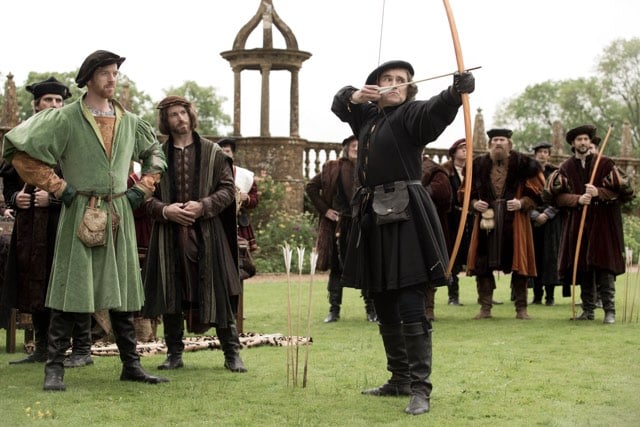Mike Poulton adapted Hilary Mantel’s Wolf Hall and Bring Up the Bodies for the stage. The play premiered last year in the UK and just began its run on Broadway here in NYC. There’s a book version of the adaptation that contains some notes that Mantel wrote for the actors playing the various characters. The New York Review of Books has an excerpt of Mantel’s notes; here’s Anne Boleyn:
You do not have six fingers. The extra digit is added long after your death by Jesuit propaganda. But in your lifetime you are the focus of every lurid story that the imagination of Europe can dream up. From the moment you enter public consciousness, you carry the projections of everyone who is afraid of sex or ashamed of it. You will never be loved by the English people, who want a proper, royal Queen like Katherine, and who don’t like change of any sort. Does that matter? Not really. What Henry’s inner circle thinks of you matters far more. But do you realize this? Reputation management is not your strong point. Charm only thinly disguises your will to win.
The BBC aired a six-part TV version of Wolf Hall & Bring Up the Bodies that finished up a month ago, and PBS will start showing it this weekend. I’ve watched all but the last part and it’s really well done.

Wait, how did I miss this…Hilary Mantel’s excellent pair of novels about Thomas Cromwell & Henry VIII, Wolf Hall and Bring Up the Bodies, are being turned into a six-part BBC miniseries. Outstanding! Noted Shakespearian actor Mark Rylance will play Cromwell with Homeland’s Damian Lewis as Henry VIII.
BBC One will be airing the show in Britain in January while American audiences without access to BitTorrent will have to wait until PBS airs it in April.
And so it begins, the end of the year lists. Love ‘em or hate ‘em, you’ve got to, um, … I’ve got nothing here. You either love them or hate them. Anyway, the NY Times’ list of the 100 notable books of the year is predictably solid and Timesish.
BRING UP THE BODIES. By Hilary Mantel. (Macrae/Holt, $28.) Mantel’s sequel to “Wolf Hall” traces the fall of Anne Boleyn, and makes the familiar story fascinating and suspenseful again.
BUILDING STORIES. By Chris Ware. (Pantheon, $50.) A big, sturdy box containing hard-bound volumes, pamphlets and a tabloid houses Ware’s demanding, melancholy and magnificent graphic novel about the inhabitants of a Chicago building.
I absolutely demolished Bring Up the Bodies over Thanksgiving break and loved it. I haven’t had a chance to sit down with Building Stories yet, but that massive and gorgeous collection is a steal at $28 from Amazon. And as far as lists go, another early favorite is Tyler Cowen’s list of his favorite non-fiction books of the year. Cowen is a demanding reader and I always find something worth reading there. (via @DavidGrann)
I loved this profile of novelist Hilary Mantel written by Larissa MacFarquhar. Not just for the subject matter but the lyrically novelistic way in which it’s written.
During this time, she discovered that her house was haunted. It wasn’t only she who felt it-she overheard adults talking about the ghosts as well. She realized that they were as frightened as she was, and were helpless to protect her. She already understood that the world was denser and more crowded than her senses could perceive: there were ghosts, but even those dead who were not ghosts still existed; she was used to hearing talk in which family members alive and dead were discussed without distinction. The dead seemed to her only barely dead.
Until she was twelve or so, she was deeply religious. “When you’re inculcated with religion at such an early age, or when you’re receptive to it, as I was, you become preoccupied with the unseen reality,” she says. “This other world, the next world, to me in my childhood seemed just as real as the world I was living in. It wasn’t that I had a mental picture of it — it was that I never questioned its existence. I used to conduct a lot of imaginary conversations with God. I don’t think Jesus was any less real to me than my aunts and uncles; the fact that I happened not to be able to see him was pretty irrelevant to me.”
She felt, as a child, in a permanent state of sin. There was something terribly wrong about her, for which she was to blame, but which she had only limited ability to change. Catholic guilt continued to grip her even after she stopped believing in God. Her family’s misery was encompassing and bewildering, and was it not likely that she was responsible for making her parents so unhappy? Might they not, without her, have a chance at a better life? But these suspicions were not so powerful as the effect of a thing that happened to her one day that she cannot explain.
That “thing that happened” was seeing… well, I don’t want to spoil it. Mantel wrote Wolf Hall, a recent favorite of mine, and a few days after this profile ran in the New Yorker, she won the Man Booker Prize for her new novel, Bring Up the Bodies.






Stay Connected